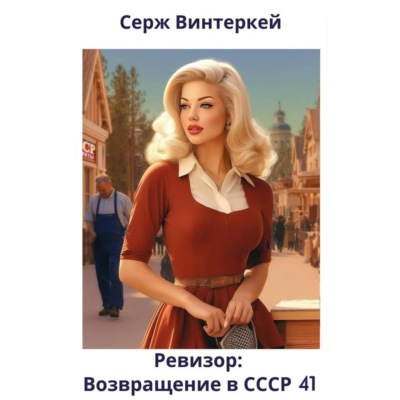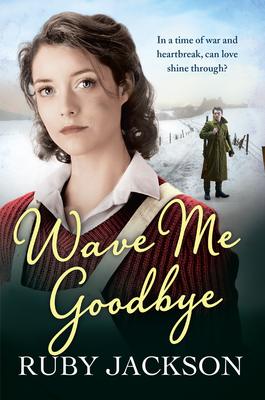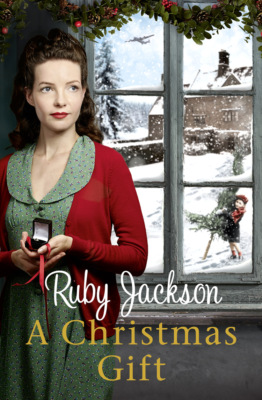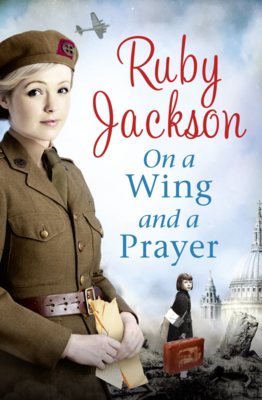Loe raamatut: «Churchill’s Angels»
RUBY JACKSON
Churchill’s Angels

Copyright
This novel is entirely a work of fiction. The names, characters and incidents portrayed in it are the work of the author’s imagination. Any resemblance to actual persons, living or dead, events or localities is entirely coincidental.
Harper
An imprint of HarperCollinsPublishers
1 London Bridge Street
London SE1 9GF
Copyright © HarperCollinsPublishers 2013
Jacket layout design © HarperCollinsPublishers Ltd 2013
Jacket photographs © Colin Thomas (girl); UPPA/Photoshot (background)
The Author hereby waives all moral rights in the Work. Notwithstanding the foregoing, the Publishers undertake to include the Author’s name in all copies of the Work.
A catalogue record for this book is available from the British Library
Source ISBN: 9780007506231
Ebook Edition © May 2013 ISBN: 9780007506255
Version 2016-10-17
All rights reserved under International and Pan-American Copyright Conventions. By payment of the required fees, you have been granted the non-exclusive, non-transferable right to access and read the text of this e-book on-screen. No part of this text may be reproduced, transmitted, down-loaded, decompiled, reverse engineered, or stored in or introduced into any information storage and retrieval system, in any form or by any means, whether electronic or mechanical, now known or hereinafter invented, without the express written permission of HarperCollins.
This book is dedicated to Sarah and Colin Ramsay
Table of Contents
Title Page
Copyright
Dedication
Chapter One
Chapter Two
Chapter Three
Chapter Four
Chapter Five
Chapter Six
Chapter Seven
Chapter Eight
Chapter Nine
Chapter Ten
Chapter Eleven
Chapter Twelve
Chapter Thirteen
Chapter Fourteen
Chapter Fifteen
Chapter Sixteen
Chapter Seventeen
Chapter Eighteen
Chapter Nineteen
Chapter Twenty
Read on for an exclusive extract from Grace’s story, Wave Me Goodbye.
Acknowledgements
About the Author
About the Publisher
ONE
August 1939
‘Cheerio, Mrs Richardson.’
Daisy Petrie held the door open as her last customer, still grumbling under her breath, left the shop.
‘Give me strength,’ Daisy muttered. ‘I have got to get out of here.’
She stood for a moment watching the old lady’s progress along the crowded High Street. Two large trams passed each other as they flew noisily along their tracks and the indistinguishable words of a carter and a van driver drifted over to her on the warm air.
The day promised to grow even warmer, and she caught the smell of fresh fish from the open window of a neighbouring shop.
Hope somebody buys them before they go off, she thought ruefully as she stepped back into Petrie’s Groceries and Fine Teas.
She looked around the family’s small shop, the place where she had worked almost every Saturday while growing up, and full time since she had left school. It was, as small, family-run grocery shops go, a pleasant place. Behind the counter was a wall that, to the child Daisy, had seemed a magical place, lined as it was with large black tins, each one exotically painted with brightly coloured Chinese dragons. Inside each tin, sweet-smelling tea leaves waited to be weighed out for knowledgeable customers.
The large window, into which her dad, Fred Petrie, put out the bargains of the day, looked out over the busy High Street, and there in the middle of the street now stood Mrs Richardson, chatting enthusiastically to young Mrs Davis, who was obviously trying to be polite while keeping an eye on two active toddlers.
‘Not too tired to stand now,’ said Daisy.
Mrs Richardson had grumbled loud and long about having to wait while Daisy had dealt with the three customers before her.
‘Should be two assistants working every day, Daisy, not just when it suits you, and so I shall tell your dad or your mam when I see them. Kills me, all this standing about, absolutely kills me.’
Daisy had apologised, explaining that her father was at the market, since it was market day, and her mother … she had not given the actual explanation, but had taken refuge in ‘busy in the back’, a euphemism that covered a multitude of explanations. Her mother was actually upstairs in the family flat baking for the party Daisy and her twin sister, Rose, were giving for their friend Sally Brewer. Sally, to Daisy’s delight and more than a little envy, had actually been accepted at a drama college.
What would it be like to go to college, to learn new things every day, to earn a certificate with your name and special letters after it, which would show the world that you were very good at something?
I want to do more with my life than weighing tea leaves and lentils, but what?
Daisy looked at herself in the spotless mirrored art deco panel on the locked cupboard that held patent medicines. She frowned at her image. Oh, to look like Sally, tall, slender, with glorious eyes and blue-black hair, or even her own twin sister, Rose, who was as tall and slim as Sally but had the Petrie family’s corn-coloured hair, which reached almost down to her waist and which she usually fashioned into a long pigtail. Daisy could see nothing exciting in her own short dark hair, her beautifully shaped eyes or her compact athletic body. She did not see the kindness in those green eyes or the willingness to see the best in people that shone from them.
I’m stuck here because Mum needs someone to help out in the shop when she’s busy upstairs. Simple as that.
Four years. Four years, five and a half days every week. Rose had worked in the shop on odd Saturdays and sometimes during school holidays, but none of the three boys had ever been behind the counter. Sam, the eldest, had driven the van on deliveries and maintained the engine, a skill he had passed on to his sisters. They had learned how to drive while still in primary school and both girls could strip an engine almost as well as Sam by the time they were fifteen.
Neighbours and friends had often said to Sam, ‘You’ll be taking over from your dad, a big lad like you,’ but Sam had made it clear that he had no wish to continue in his father’s footsteps. He had joined the army as soon as he could. Ron, Phil and Rose had followed one another into local factories as soon as each left school, but Daisy had been given no choice.
‘You’re finer made than Rose, Daisy, pet. Working here in the shop you won’t never get wet or cold in the winter. Shut the door at six o’clock and you’re home.’
And bored stiff. Daisy could think it but could never say it.
Years before, her mother had got it into her head that Daisy was delicate – possibly because Daisy was not as tall as her sister and brothers, though certainly not because she had suffered more than her share of childhood illnesses. The Petrie children, well-fed, well-clothed and well loved, had sailed through childhood with the minimum of trouble. But nothing that anyone, including the local district nurse, said could make the over-anxious Mrs Petrie change her mind. And so ‘delicate’ Daisy stayed at home and dreamed of a different life. What it might be, she had not yet discovered.
She stepped behind the counter where her father’s pride and joy, the beautiful old till from the National Cash Register Company from far-away Ohio, had stood for as long as she could remember, and looked along its length. She spotted a tiny pool of oil on the usually spotless surface. She sniffed it. Sardines? How had oil from a tin of sardines got on the counter? She took a clean cloth from a bucket hidden under the counter and mopped up the oil, noting that the fishy smell still hung in the air. Opening the door to let in fresh air would take care of that.
‘Well, I timed that perfect.’ Her father had arrived on the doorstep just as she opened the door. He looked questioningly at the cloth still in her hand.
‘Sardine oil on the counter.’
‘Sorry, love, I opened a tin for next door’s cat. Like to encourage him to visit, very discouraging to any little mouse who happened to pass by. Anything happen while I was gone?’
‘Just the usual. Steady stream first thing and then three of the usual complainers complaining one after the other. Mrs Richardson made a fuss because she was last in line and had to wait, Miss Shoesmith complained about the price of bacon. Miss Partridge asked why we never had the width of knicker elastic she needed, and I bit my tongue and didn’t remind her that this isn’t a haberdashers. Even the vicar said with sugar already as scarce as it is what shall we do if there’s a war and rationing. A usual Friday morning.’ She looked at him more closely. ‘You look a bit tired, Dad. Why don’t you sit down and I’ll run upstairs and make us a cuppa?’
‘Good girl, Daisy. I am a bit worn. Afraid I don’t handle heavy sacks the way I used to, so I’ve left supplies in the van till the lads get home. And next time Mr Tiverton comes in tell ’im there isn’t going to be a war. I fought in the war to end all wars.’
‘Yes, Dad, and that’s why they’re reopening the old fever hospitals, like the Joyce Green – and not for plague victims.’
‘They’ve all got it wrong, pet. Besides, the King, God bless him, is family.’
‘That’ll make a difference, I don’t think,’ whispered Daisy as she hurried up the narrow carpeted stairs to the crowded flat in which the family lived. Her mother was in the comfortable, cosy kitchen and the smell of baking apples filled the air.
‘Time for a cuppa, Daisy, love? Did I hear yer dad? He’s early back from the wholesaler.’ She moved the always-filled kettle over on the stove to an already hot plate.
‘Apple turnovers for the party, Mum?’
Flora Petrie, as round as her apple turnovers, smiled. ‘I might be able to spare one for a hard-working shop assistant.’
Less than ten minutes later Daisy was sitting on the bottom stair drinking her tea and reading the newspaper. Her father drank his propped up behind the counter ready to deal with any customer.
Daisy read the papers cover to cover as often as she could in order to keep up with everything that was happening, not only in their home town of Dartford but in the wider world. Newspapers and the wireless kept the family abreast of all the rumours that were flying around.
‘Grand baker, your mum,’ commented Fred when Daisy joined him.
‘Is that a Times you’ve got there, Dad? Don’t get apple on it. Mr Fischer hasn’t been in for his yet.’
Before Fred could answer, the door pinged its warning. ‘Lovely smell of baked apple in here this morning.’ The local postman, Bernie Jones, was framed in the doorway, and bright sunshine poured in behind him.
Bernie held out a slim envelope. ‘Got a fellow in the army, Daisy, or do I recognise Sam’s handwriting?’
‘Very funny.’ She turned to her father, who had stopped reading to pass the time of day with the postman. ‘You all right here, Dad, while I run up and read this to Mum? See you tomorrow, Bernie.’
Upstairs Flora was busily preparing sandwich fillings. She was excited that there was a letter from her eldest son, but a little disappointed that it was not addressed to her. ‘What’s he saying?’
Daisy sat down, opened the flimsy envelope, and read it quickly.
Hello, Daze,
Tell Mum sorry I haven’t written, been busy. Rose says as you’re arranging a party for Sally on the 18th. Wish I could be there. Drama college, imagine. Little Sally Brewer. She’ll be too posh for the likes of us when she’s finished. Remember there was an order for men my age to sign up for six months last April? Lads even younger did too, and you bet my words our Phil and Ron’ll be joining them afore long. I like the life, Daisy, and it’s treating me right. Got room to breathe. Don’t listen to them politicians, Daze. Either they don’t know or they don’t want to tell us but there’s going to be a war and women’ll be needed, so think careful about what you’re going to do. Best to choose than wait to be ordered. Rose is fine in Vickers. Shouldn’t think they’ll shift her, but the shop has three employees and happen they’ll say two is enough.
If this gets to you before the party, tell Sally, well, wish her all the best.
Sam
‘It’s nothing really, Mum. He likes the army and he says hello to Sally.’
‘That’s it?’
Daisy nodded. ‘At least he writes to us.’
Flora almost grunted. ‘Daft lad is sweet on Sally, always has been, and she’ll not look at him.’
Daisy was startled. Sam, sweet on her friend Sally? No, Sam was kind to everyone. ‘Don’t be daft, Mum. He’s just as kind to Grace, or to me.’
‘He sees Grace as a wounded bird. Too soft, by half, my Sam. And not a word about where he is or what he’s doing.’
Daisy took some troublesome thoughts down to the shop. If there was a war, and surely Sam was in a good place to know, would the Government decide that a local shop with three employees – even if one was mainly for delivering – was overstaffed? Might an opportunity for her to spread her wings be just round the corner? Scary. And then there was Mum’s remark about Sam and Sally. Sam sweet on Sally? No. Never. If Sam was sweet on anything it was a machine, not a girl. Her big brother had always looked after his twin sisters and their friends.
‘Bernie says enjoy the party. Seems the whole street’s talking about it.’
‘Talking about it is all that has happened, Dad, except for Mum’s baking.’ She frowned. ‘What do you think about moving the tinned beans up to the shelf below the Spam, and the tinned pears below them? Could give a customer an idea for a whole meal.’
‘Good idea. We haven’t shifted many of those pears. I’ll deal with customers.’
What a brain you have, Daisy Petrie. World-shattering idea there. Daisy started work on the shelves beside the door that led to the stairs. War, according to Sam, would bring opportunity. But do I want opportunity at such a price? Thoughts went spinning around in her head as she worked, completely ignoring the musical ping of the doorbell as customers came in. Mr Fischer, an elderly resident and a particular favourite of Daisy, came in to buy his paper. He also bought some tea and, as tin after tin of various teas was opened, the scents of the east obliterated the mundane smell of sardines.
Daisy thought of her sister, Rose, busy at the Vickers munitions factory until seven and so unable to help with party preparations. The boss there obviously had no faith in the ‘there will be no war’ newspaper articles and had, in fact, stepped up production.
Baked beans, Spam, pears followed one another onto her dusted shelves and at last she was finished and free to return to the flat to prepare for the party.
‘I’ve given the front room a bit of a dust, and brought in some extra chairs. Any more turns up and they’ll have to sit on the floor.’ Flora was now arranging her sandwiches on her best plates.
‘Thanks, Mum, but we can’t dance if the floor’s cluttered up with chairs. I’ll have a look once I’ve washed.’
‘You should have a rest, pet.’
The words, ‘I’m as healthy as one of Alf’s horses’ formed on the tip of her tongue but she managed to swallow them. If there was going to be all-out conflict, she would not spend many more days weighing porridge oats and rice and reading the newspapers. ‘Don’t be scared, Daisy. Start thinking about what you can do that’s useful,’ she muttered under her breath as she effortlessly carried two bedside chairs – complete with pink ruffles – back to her parents’ bedroom.
The party went with a swing. Flora Petrie had made new full skirts for the twins: Rose’s was a multi-coloured floral, perfect on her tall, slim body, but for the daintier Daisy she had chosen a dark green cotton that went perfectly with a puff-sleeved sea-green blouse that she had found on a stall at a local market. Even Grace Paterson, Daisy and Rose’s other close friend, had dressed in party mood and confided to her friends that she had found her sleeveless, full-skirted black and white dress on sale in the charity shop managed by her sister.
Somehow it seemed as if no one had told Sally about her ‘surprise’ party. The postman knew all about it – and therefore everyone on his route knew – but Sally swore she did not. She exclaimed over the large poster, drawn by Daisy and Rose, which said in large letters, ‘Good Luck, Sally’, and, ‘Sally Brewer, Dartford’s Star’, and asked if she could have it to hang in her own bedroom in her parents’ flat next door to the picture house, where her father worked as the projectionist. Of the nineteen former school friends who had been invited, four had had to refuse the invitation or have it refused for them. Two lads had already joined a branch of the growing military and two others were working overtime in the Powder Lane munitions factory.
The fifteen remaining ate the sandwiches and apple turnovers, and drank the fruit punch to which a carefully measured amount of alcohol had been added, and proceeded to dance the night away. Most of the young people had left school aged fifteen. Only Sally, Dartford’s star, had gone on to a grammar school. Now that she was to begin a three-year course in speech and drama, her friends dreamed of seeing her on screen in the local cinema. Daisy, Rose and Grace intended to keep the friendship strong.
The twins had known Sally since primary school. Grace, however, had arrived in Dartford at the age of seven when, for reasons that no one seemed to know, she had been sent from her foster home in Scotland to live with her adult half-sister, Megan Paterson. Sally and the twins, children from loving homes, had unquestioningly accepted the newcomer into their solid friendship.
The party was finally over and when all the others had taken their leave, the twins and Grace made Sally sit down in the best chair.
‘We have a present for you, Sal. Close your eyes,’ ordered Rose.
There was the sound of paper rustling and then, ‘Open your eyes. Tada!’
The three girls had saved part of their wages all summer and Sally saw herself looking at a most elegant two-piece costume. It was navy blue, perfect with her blue-black hair. The jacket had the new squared shoulders and a close-fitting waist, and the fashionable-length skirt had a small pleat that would make movement easy.
Sally was speechless. ‘I don’t know what to say,’ she managed after a while. ‘It’s fabulous.’ She thought for a moment and gave it the ultimate accolade. ‘It’s exactly what Margaret Lockwood would wear, and perfect for interviews. But you’re all very wicked. Now I know why no one’s had an ice cream at the pictures all summer. Next Friday the ice creams are on me.’
‘Oh, and I forgot,’ said Rose later as they stood chatting in the middle of the brightly coloured rag rug, ‘Mum tells me big brother Sam wrote today.’ She made a pose perfect for a swooning heroine in one of the desert sheik films so loved by all four girls. ‘He’s sweet on you, Sally; can you believe it? Our big Sam and Sally.’ She began to laugh and the others laughed, Sally, Daisy, Rose … but not Grace. Quiet Grace, in appearance more like Daisy than Daisy’s own twin sister, was not laughing. Little orphaned Grace, who had been protected by the tall, blond, sports hero Sam Petrie since her arrival in Dartford all those years ago, and who had loved him devotedly ever since, stood on the edge of the rug looking as if her world had just fallen apart. Grace, who had been taught by her sister that she was both worthless and useless, had never expected the shining light that was Sam to love her but she had dreamed of a miracle.
‘He sent her a special message, Rose, didn’t he?’ teased Daisy. ‘Couldn’t quite bring himself to say, “Tell her to come with me to the Kasbah,” but you could see where he’d scraped something out.’
Sally turned to her. ‘Daisy, you are wicked. Poor Sam; he wouldn’t say anything of the kind. Don’t you think that’s funny, Grace, me and Sam? Sam Petrie. I’ve known him my whole life.’
Grace had half turned so that she was not looking directly at her friends but had not really turned her back on them. Her eyes were suspiciously bright but possibly the others did not notice. ‘I don’t think that feelings should be laughed at. Whatever Sam said, it was a private message to Sally and not a joke.’
‘How about a nice cuppa before we all trot off?’ Daisy, aware that the frivolous atmosphere was now heavy – and she would worry about the reason later – broke in. ‘Rose, Mum and Dad’ll want something hot before bed, and Dad did say he wanted to walk Grace home. He’ll pass your door too, Sally, and help you carry your loot.’
‘And didn’t I do well considering it isn’t a birthday or anything?’ Several of their friends had brought ‘good luck’ gifts.
‘Try it on, Sally,’ begged Daisy. ‘We’ve had it hanging on the back of the bedroom door for two weeks now and we just have to see if it fits.’
Sally looked towards the kitchen door beyond which the Petrie parents were listening to the wireless. She held out her arms. ‘Come here, all three of you. You are the best friends I will ever have and I want nothing to come between us.’
‘If you squeeze us much more, Sally Brewer,’ laughed Daisy, as the girls hugged one another, ‘a flea couldn’t come between us.’
The moment of tension passed but was not forgotten.
A few days later Daisy was reading the local paper, the Dartford Chronicle, when the shop door opened. She looked up to see her favourite customer, Mr Fischer. He was carrying a newspaper.
Daisy grimaced, guessing what the problem was, but managed to greet him politely.
‘There was a sticky bit on the sports page of this one, Daisy, and so I’ll have one you’re not reading today, if you don’t mind,’ the old man said with an understanding smile.
Daisy hurried to get a pristine copy from the pile behind the counter and handed it over. ‘Sorry, Mr Fischer, no charge today.’
‘But of course I will pay, my dear. It is a privilege to walk calmly into a shop, be greeted by a pretty girl, and be allowed to buy what I can afford.’ He put the coins down on the counter. ‘Anything of interest I shouldn’t miss today?’
Over the years, while she had worked in the family shop part time and then full time, Daisy and the elderly man had developed a friendship. Daisy knew that he was German and that he had left Germany almost ten years before for reasons he did not divulge. The family had decided that he was Jewish and gradually they had learned that he was also very well educated, for he had talked to Daisy about things that her parents could not begin to understand. She was in the habit of reading the newspapers while she waited for customers, and when there was a picture or a headline that she did not understand she would talk to gentle Mr Fischer about it. In this way she had learned about stars and galaxies, early civilisations, the development of language and of mathematics, and of countless other fascinating things. He discussed with her the life cycle of a frog, the birth of a butterfly, and he tried to explain how a bird or a plane could fly and even why a huge ship did not sink under its own weight. These days, however, all their discussions were of the prospect of war.
Daisy looked at the old man, wondering for the first time if he was as old as he appeared to be. What horrors had he encountered that had forced him to leave his own country to live in another where he could worship in his own way? Every day that he came in for his paper or a few groceries, he was always perfectly dressed: collar, tie, hat and, in cold weather, gloves. He had his standards and dignity. She smiled at him with affection. ‘I don’t suppose you’re interested in wedding pictures and lists of the guests, but …’ she looked at him shrewdly and decided cricket rather than football might interest him, ‘… there’s some cricket coverage and a very good recipe for cabbage soup.’
‘Today no war and rumours of war, Daisy?’
‘Not really, but my brother Sam – the one in the army – well, you do know that he has been saying since last year that there will be a war with Germany. He says I should think hard about what I want to do for the war effort.’
‘And what have you decided, young Daisy?’
Daisy shook her head ruefully. ‘It’ll be factory work, I suppose, same as Rose. Clever girls with an education will get the exciting jobs.’
‘Someone will still have to sell the newspapers, with or without jam on them.’
‘Actually, it was stewed apple. Mum baked turnovers for the party. Sorry, Mr Fischer, I like you, and most of the customers, but measuring out bits of cheese and weighing tea leaves isn’t very exciting, is it?’
The old man folded the newspaper. ‘One day, Daisy, you may thank God for the comforting ordinariness of it. As always I like our little chats. I may try the cabbage soup; I have a liking for cabbage. Good morning.’ He left the shop, lifting his hat to Daisy as he went and she stood looking after him. Such an odd Dartford resident …
Someday I might be glad to be doing something ordinary – I don’t think so, Mr Fischer. What happened to you? Daisy wondered. She recalled some of their serious discussions and many of the wonderful things he had explained so that she could understand. He should have been a teacher, she decided, and went back to reading the paper until several housewives arrived, almost every one accompanied by children of various ages.
It was a very tired Daisy who closed the shop at the end of the day and climbed the stairs to the flat. Customers accompanied by children were always the most difficult to serve. Sometimes children whined or opened the doors of cupboards they had been specifically told not to touch, and tried to pull out the contents. Some mothers were good at keeping their children in line, others paid no attention to them; it all made extra work.
In the kitchen a pot of carrot, not cabbage, soup was keeping warm on the back hotplate.
‘Thanks, Mum,’ Daisy said aloud to the empty room as she helped herself to a large serving and cut herself a slice of bread.
Daisy had been on duty in the shop all day because Flora and Fred had gone to an afternoon meeting in the Market Street Clinic. Mr Chamberlain might still be telling the nation that there was not going to be any conflict but Dartford had taken the threat of war very seriously and had been preparing for some time. The town had been designated a vulnerable area. To find out the exact meaning of that word, the family had consulted the heavy dictionary in the front room.
Early in May Fred and Flora had gone to the State Cinema in Spital Street to see a film called The Warning, which dealt with the possible effects of an air raid, and Fred had been so affected that he had immediately volunteered to become an air-raid warden.
‘Dartford’s not the safest place to be if war comes,’ Fred had told his children. ‘The enemy’ll have to fly over us before they reach London.’ He tried to smile. ‘Could get quite noisy here.’
Already there were thousands of sandbags, stacked like secondary walls, protecting important buildings, and since it was believed that, if war came, there would be gas attacks, gas masks had been issued. Air-raid shelters and first-aid stations had been set up in the St Alban’s Hall and at the County Hospital. Trenches that reminded Fred and others of the ‘war to end all wars’ had been dug in Central Park and on Dartford Heath. As one of the first wardens to volunteer to help in assuring that Air Raid Precautions were carried out, Fred was learning how to deal with incendiary bombs at the clinic. Flora went along to all the meetings. After all, Fred would often be away from the flat and the shop, and she was determined to find out how to deal with anything that might fall on her home and her children.
‘Nothing learned is ever wasted,’ she was fond of telling her children, ‘but what on earth we’re going to do with all the sand when them that’s in charge decides we’ve been wasting our time, I do not know.’
Daisy decided to make toasted cheese to go with the soup and was busily slicing cheese when she heard the flat door open and her parents and sister come in. They had met on the way home.
‘The boys show up yet, love?’ Flora asked as she hung up her lightweight summer coat and looked for her apron.
‘Sorry, Mum,’ Rose interrupted. ‘I’m that tired I forgot to tell you. They’re doing overtime and said not to worry about their tea, they’ll get some chips on the way home.’ She took herself off to the small family bathroom to change and to wash off the grime from a long day’s work in the oily munitions factory.
‘They’ll have a proper tea when they get home; chips isn’t nourishment for such big lads.’
‘Don’t worry about them, Flo. I bet they take some liquid nourishment with their chips.’ Fred was already sitting in his chair by the empty fireplace, a glass of his favourite Reffells’ ale in his hand while they waited for Rose’s return.
When she reappeared, he teased her, ‘I think it’s our Rose needs nourishing.’
Rose, her long fair hair released from its firm elastic bands, and washed and combed, sat down at the kitchen table. ‘It’d be easier if the people in power would make up their blinking minds. Down the factory we’re past caring, we’re that tired, but we do want to know. There’s been more than enough muttering. I can deal with the truth but all the shillyshallying is getting on my nerves.’














